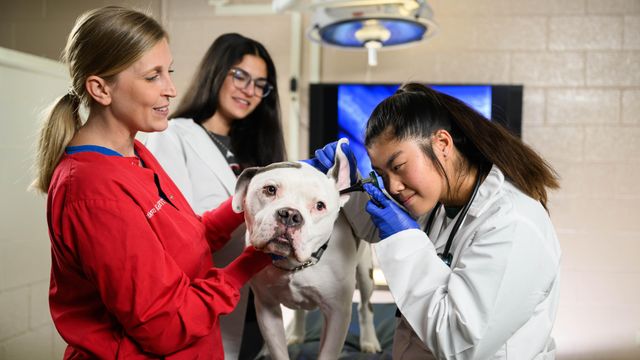The proud legacy of the NC State College of Veterinary Medicine
Innovation, approaches to problem-solving and incredible diversity of opportunity are just some of the reasons that NC State's CVM is one of the most respected veterinary educational institutions in the country.
Posted — UpdatedThe NC State College of Veterinary Medicine carries a proud legacy of service, research and outreach throughout the state. One of the younger institutions among the nation’s 32 accredited veterinary schools, it looks toward a future of growth and expansion that will significantly bolster the services it provides to pet owners and commercial food-animal producers alike.
The College of Veterinary Medicine was established in 1978 and admitted its first class of DVM students in August 1981. It dedicated its main facility in April 1983 and graduated its first class of veterinarians in May 1985, according to a formal history of the school prepared by founding dean Dr. Terrence Curtin.
"Prior to our founding, residents of North Carolina would have to attend a veterinary school out of state, such as Auburn or the University of Georgia," said Kathryn M. Meurs, Dean and Distinguished Professor in Comparative Medicine at the NC State College of Veterinary Medicine. "Today, we’re graduating more than 100 students a year."
From the beginning, the school’s mission has been one of education, research and public outreach, Dr. Meurs observed. "Our mission really is to improve both human and animal health," she explained. "Our education program trains the next generation of veterinarians and our research improves animal and human health through a wide range of mechanisms of disease prevention and intervention. Our hospital evaluates over 30,000 patients a year and we learn something new from every one of them. We take what we learn from every patient we see to improve medical care for the next patient with similar issues."
Three faculty departments comprise the College of Veterinary Medicine: Clinical Sciences, Molecular Biomedical Sciences and Population Health and Pathobiology. It employs approximately 160 faculty and graduates 100 students annually. However, the class size was recently expanded, with hopes to eventually have a class size of 125, Dr. Meurs said. A little more than 2,700 students have graduated from the college since its founding.
The College of Veterinary Medicine is well-respected within the veterinary profession, and Dr. Meurs credits that to the school’s broad approach to medicine and research. "We are problem-solvers and innovators," she noted. "A significant part of our mission is to perform research that improves disease prevention, diagnosis or treatment of animal and human diseases.
Graduates of the College of Veterinary Medicine pursue a variety of career paths, Dr. Meurs added. Some become family veterinarians, while others may become biomedical scientists or global health experts. Still others become involved with federal human and animal health programs or the military. "Our graduates fill many unique roles in society," Dr. Meurs noted. "The family practitioner is what most people think about, but that is just one aspect of what we do."
In the decades since its founding, the College of Veterinary Medicine has also made a significant impact on North Carolina’s food-animal and equine industries. "People often think of us first for their companion animals because we have a tremendous tertiary care hospital, but we are also very involved in solving important animal health problems within the swine, poultry and beef and dairy cattle industries," Dr. Meurs said. "For those industries, it’s more than helping individual animals. Poultry producers, for example, may come to us with questions about how to prevent avian influenza or for news of the latest vaccines. They come to us for larger problems that impact an entire population of animals, and that’s a relationship we’re very proud of."
The College of Veterinary Medicine is known for its leadership in several areas. "One of our faculty members, Dr. Shelly Vaden, is the new president of the American College of Veterinary Nephrology and Urology (ACVNU) a new specialty college focused on renal and urinary tract disease," Dr. Meurs said.
The College of Veterinary Medicine was also the first to develop a veterinary gerontology program to address health issues in elderly pets because companion animals are living longer than ever thanks to advances in veterinary medicine. "Dr. Natasha Olby, the Dr. Kady M. Gjessing and Rahna M. Davidson Distinguished Chair in Gerontology, is exploring ways to improve the management of common health issues that impact the aging pet population."
And then there is the college’s public outreach, which is extensive. One example is its mobile clinic, which travels the state performing spay and neuters at community animal shelters and offering emergency services during natural disasters and large-scale animal rescues.
Another example of the school’s service to the community is its long-running Turtle Rescue Team program, directed by Dr. Greg Lewbart. The program, which is run by veterinary students, provides care to turtles and other reptiles that have been injured by predators or automobiles.
When it comes to animal care, the NC State College of Veterinary Medicine is a community of problem- solvers, innovators and life-changers for everything from the family cat to turtles in your backyard.
Copyright 2024 by Capitol Broadcasting Company. All rights reserved. This material may not be published, broadcast, rewritten or redistributed.






